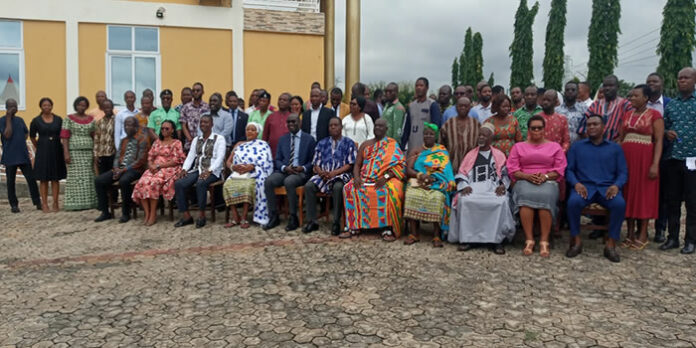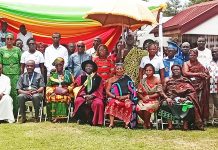The Bono East Regional Health Directorate has held a two days mid-year performance review under the theme “Building Structures for Quality Essential Service Delivery, Preparedness and Response for Emerging and Re-Emerging Diseases, the Role of the Community and Strategic Partnership” in the Kintampo Municipality to ascertain the targets set at the beginning of the year.
The Bono East Regional Health Director, Dr. Fred Adomako Boateng in his welcome address stated importance of mid-year review meeting which affords the districts and municipalities the opportunity to assess their processes which they agreed on in improving outcomes and therefore assessing performance in relation to the agreed program of work, most importantly dialogue with stakeholders to discuss further interest and concerns for the common good of the societies.
He gave the statistics of the region’s family planning acceptor rate 41.5% in 2021, 40.2% for 2022 and 45.9% as at this half year, and improved skilled delivery to 68.2% in 2023 from 65%in 2022 (Target of 60%), 68.2%.
“However, the skilled delivery index has worsened from 0.29 in 2021 to 0.27 in 2022 to 0.22 in 2023. doctor to population ratio improved from 1:20,397 in 2021 to 1:9,101 in 2022 (1:9101 for 2022), as against a target of 1:7500 but we are still battling with geographical equity index which worsen from 0.1 in 2021 to 0.04 in 2022 (Target of 0.20),he said.
“It seems like the Bono East Region Health Directorate came into existence only yesterday. But we are in our fourth year of life and very soon we will cross the threaded five years, however, if you permit me, I borrow this term from the World Vision, World Bank and the other partners that we are still in our first 100 days of life”, he stated in his address.
Dr. Adomako again said the regional stores which have been rehabilitated and refurbished and now awaiting funds to set up and stocked with medicine and medical equipment for usage are still not being attended to.
“The Bono East Region has got a lot of hard to rich areas such as Kwame Danso, Yeji etc. Travelling from these areas to Sunyani for Medicines would not be the main reason for creating the new regions by the President of the Republic of Ghana “so let’s all put hands on deck to help the region,” he said.
He further said that, some amenities could be provided to top health workers to motivate them t from travelling abroad to seek greener pastures as accommodation, car loan. “Some landlords increase their rent if they get to know that a health worker is coming to occupy their house,” he said.
He thanked the regional minister, traditional and religious leaders, the Ghana Health Service Council, DG and headquarters, senior management at the regional health director, district directors, medical superintendents, CHAG, private facilities, WHO, UNICEF, PATH, IMPACT MALARIA, Jhpiego/Rise, Kintampo Health Research Center, College of Health and Well-being, and the media for supporting health delivery in the region.
Dr. Paulina Clara Apia, the Deputy Director Public Health Bono East Region, touched on President Nana Addo Dankwa Akufo-Addo’s government’s plans for the Health sector in the country including, building health system resilience for universal health coverage and health security during the Covid-19 pandemic and beyond. She mentioned that district Assemblies and members of parliament continue to support the construction of CHPs across the region.
“All the communities, religious leaders and opinion leaders in the region continue to support the 10 Covid-19 vaccination campaigns; mass drug administration against neglected tropical diseases and the on-going seasonal Malaria Chemoprophylaxis”, she said.
The Regional Minister Mr. Adu Gyan, said the Bono East Regional Coordinating Council’s strategic plan had earmarked a site for a teaching hospital in the region to provide tertiary level of care, and that it would continue to lobby for resources for all sectors, including health.
The Minister said the theme was appropriate, considering the brief on the World Health Organisation (WHO) position on building health system resilience for universal health coverage and health security during the Covid-19 pandemic and beyond.









